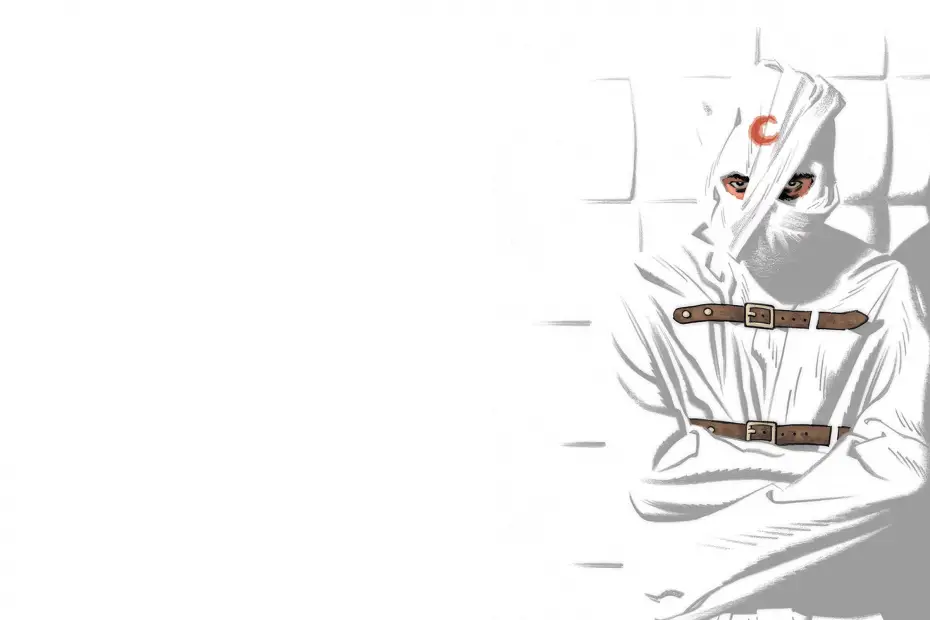
The Moon Knight Madness by Jeff Lemire: Without comics, the MCU wouldn’t exist. If he does not hesitate to move away from it to create his own story, the starting point of each of his films and series remains nevertheless anchored in its original material. Thus, each month we will try to focus on a comic that could serve as a basis for a work of the cinematic universe, without spoilers, and to give you the desire to deepen. It’s October, Halloween, and monsters, the opportunity to return today to one of the most fascinating anti-heroes of the Marvel universe and his serial adaptation.
A white knight with a blood-stained cape
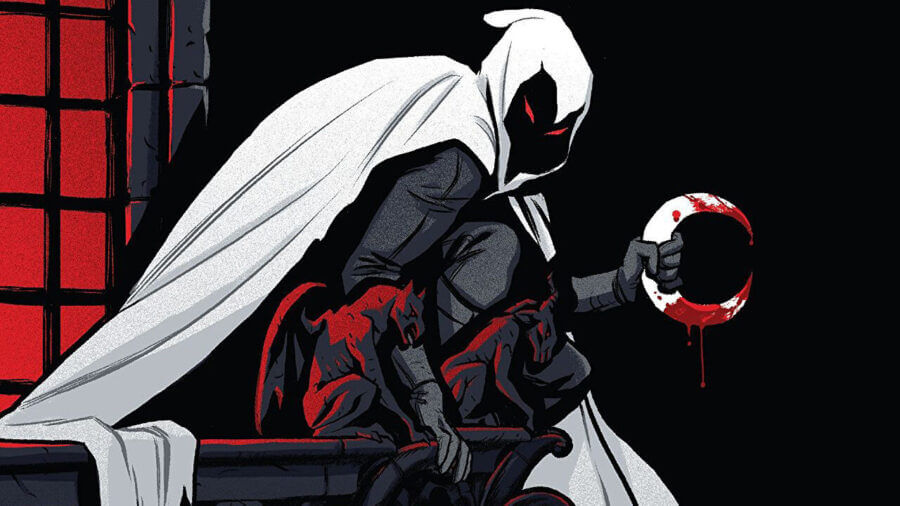
Even if it’s a bit cliché, you probably know the adage: when DC tells the story of gods who fell among men, Marvel focuses instead on men elevated to the rank of gods. The Moon Knight case thus breaks this dynamic and imposes a new balance of power: a man saved by a god and forced to serve him. Marc Spector was born in the pages of another anti-hero of the Marvel stable, Jack Russell, aka Werewolf by Night (who recently had an excellent Halloween Special on Disney+), and then presents himself as a mercenary in charge of hunting down the werewolf.
His immediate popularity, greatly helped by his atypical design, pushed Marvel to make him a character in his own right, creating a series of his own and changing his origins to make him even more unique. While Marc still has a mercenary past, it is revealed that he died during a mission and was resurrected by the Egyptian moon god Khonshu, who gives him powers and his Moon Knight costume. Screenwriter Doug Moench, who would later work on Batman, deliberately kept an ambiguity around Khonsu’s real existence, which would make all the salt of the character and let his successors have fun with the readers’ perception.
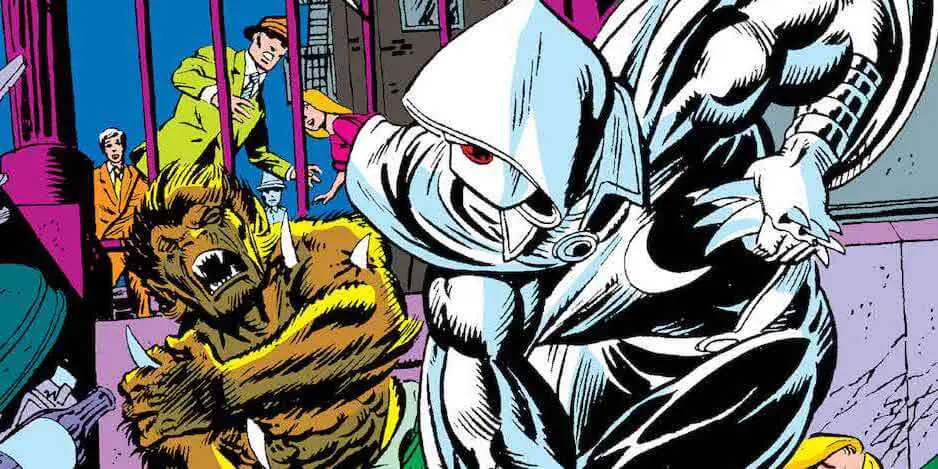
Because the particularity of this hero is his relationship to reality, as well as his different personalities more or less put forward depending on the scriptwriter. In his first series, there is never any mention of dissociative identity disorder, a disease that will be attributed to him in much more recent runs. Marc Spector uses two alter egos to carry out his missions: Steven Grant is a wealthy businessman able to frequent high society, while Jake Lockley is a New York taxi driver more likely to infiltrate the slums of the city. Over the series and writers, these avatars will become more and more important in the construction of the character, until being taken up by the series released on Disney+ this year.
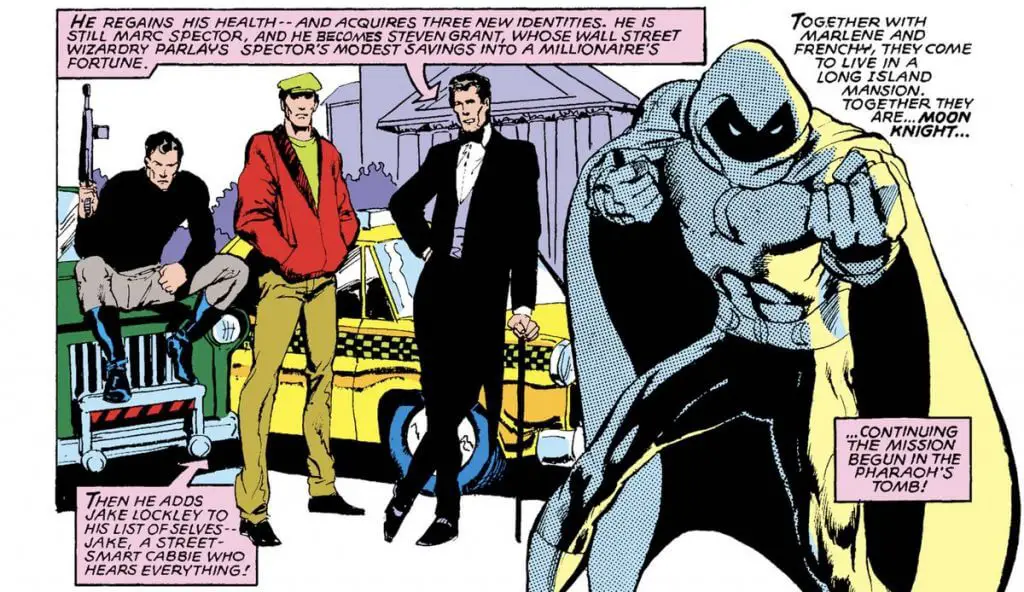
The definite interest of the Moon Knight comics is that each of its runs is an experience in itself, defined by the wishes of its writer. Rather unknown to the general public (before its introduction in the MCU), Moon Knight allows you to play with codes and genres so that all its runs adopt a different tone. In 2006, Charlie Huston chose a brutal and extremely dark story, where the dissociative disorder of the hero is completely questioned. In 2011, the famous Brian M Bendis (at the helm of Secret Invasion for example) gives new personalities to Moon Knight, which take the form of Spider-Man, Captain America, and Wolverine. Three years later, Warren Ellis created the alter ego Mr. Knight and gave his story a pretty great thriller atmosphere. His special status and his character as a dubious narrator give this anti-hero a charm quite unique in the great Marvel stable, and as part of the All-New, All-Different relaunch of most of the titles of the House of Ideas, Jeff Lemire fully seizes the tragedy of the Knight of the Moon to write an anthology run.
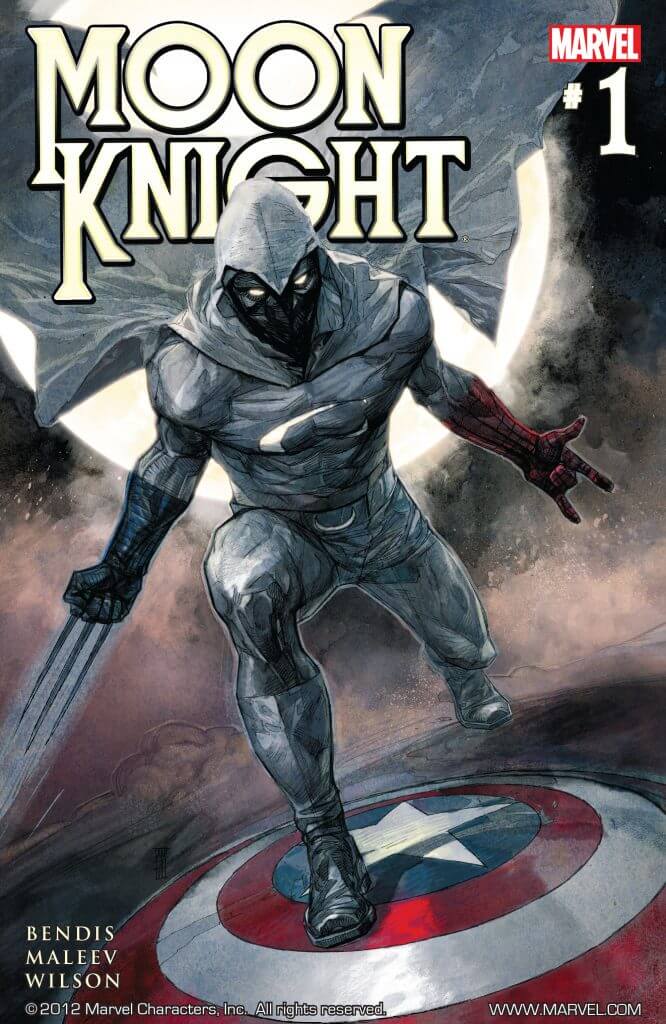
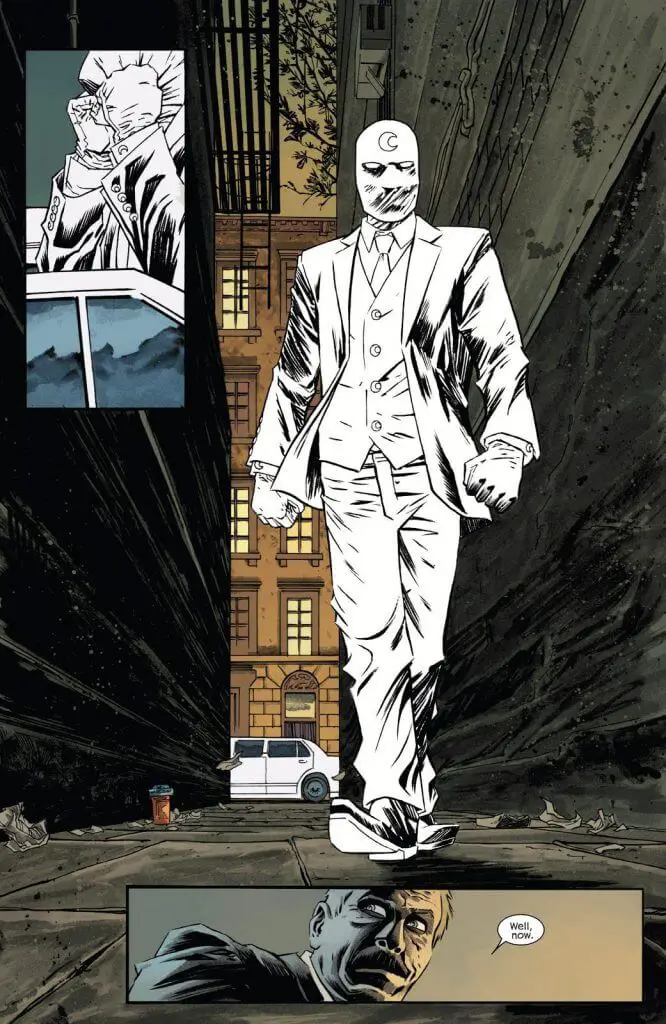
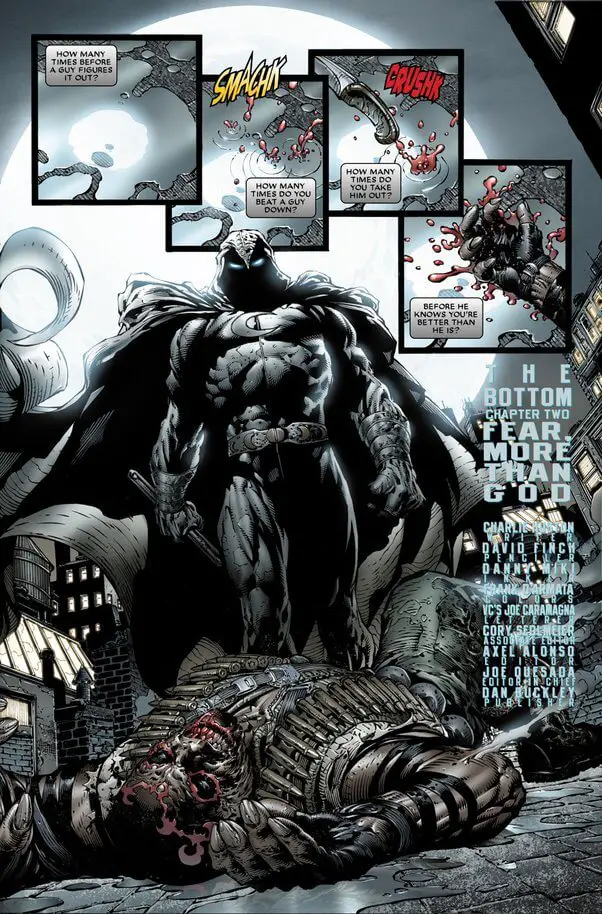
A perpetual inner struggle
Former DC, Lemire wants to shake up the mythology of Moon Knight and put his identity back at the heart of the game. He says he wants to “really explore mental illness through this character” and places at the heart of the issues the internal struggle that agitates Marc Spector and its many facets. The hero’s troubles are no longer treated as an artifice or a simple difficulty to overcome, but this time presented as a mental illness from which he suffers.
This arc returns to the very origins of the multiple identities that Spector wears, with the creation of Steven Grant in his childhood, then Jake Lockley, each with a specific goal: the first to compensate for the loneliness of a child to absent parents, the second to manage strong emotions. As always, the fourth avatar is left deliberately ambiguous with Khonshu, the god of the moon. Is he a true god? An alien entity? Or a pure invention?
The author thus takes us on a fascinating study of the character’s psyche and goes beyond the simple perception that readers (and the rest of the universe as well) had about him. Marc Spector, and Moon Knight for that matter, is not just an ultraviolent madman but a truly sick man at the heart of a terribly tragic life. Forced all his life to fight against himself, he learns to ally himself with the multiple personalities that he has rejected many times and finally accepts his situation.
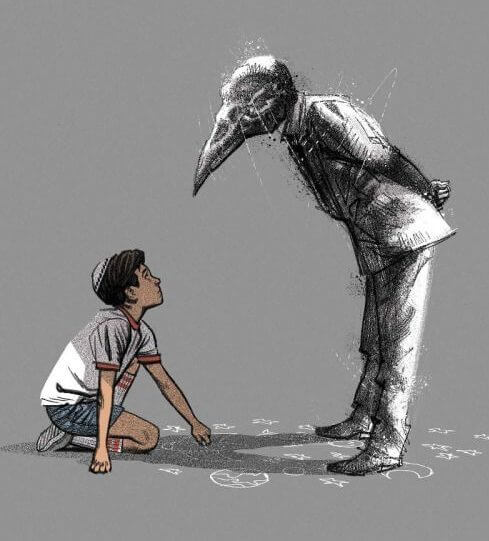
All this is also made possible by the construction of the narrative around Khonshu. By slightly modifying the canon, Lemire gives a new place to the cunning god, even insinuating that it is the basis of the condition of his future avatar. In the maze of his mind, Spector remembers seeing several times the man with the head of a bird who will torment him for years. This twist is interesting because it reverses the balance of power between the two, which until now was based on an exchange of services: Khonsu has resurrected Marc Spector into Moon Knight, and the latter confronts (and kills) criminals on behalf of his master. The moon god becomes more than a tormenter, but a true antagonist with a very personal connection to his former ally. Marc then embarks on a mission to repair his mind and end his inner struggle, before attacking what could be his last fight.
Dream or madness: a game on the borders of reality
Be careful not to get lost, this story is hard to follow and that’s the goal. When Lemire says that he wants to plunge the reader into the heart of his protagonist’s mental illness, he is not lying, and sends us on a completely crazy journey, bordering on psychedelic, into the mind (or even the spirits) of an anti-hero who seeks meaning in his existence. Marc wakes up in a psychiatric hospital, where a doctor explains to him that he has convinced himself to be a superhero called Moon Knight (if it reminds you of something, the MCU series completely adapts this run, but we will come to it soon). He finally manages to escape, with Khonshu’s help at the moment, only to find that outside, New York is ravaged by a sandstorm and an attack by mysterious antagonists. However, with a blink, the situation returned to normal. The perception of reality is totally questioned for the reader as the two worlds seem both absurd and endowed with a form of logic, which makes the story exciting to follow.
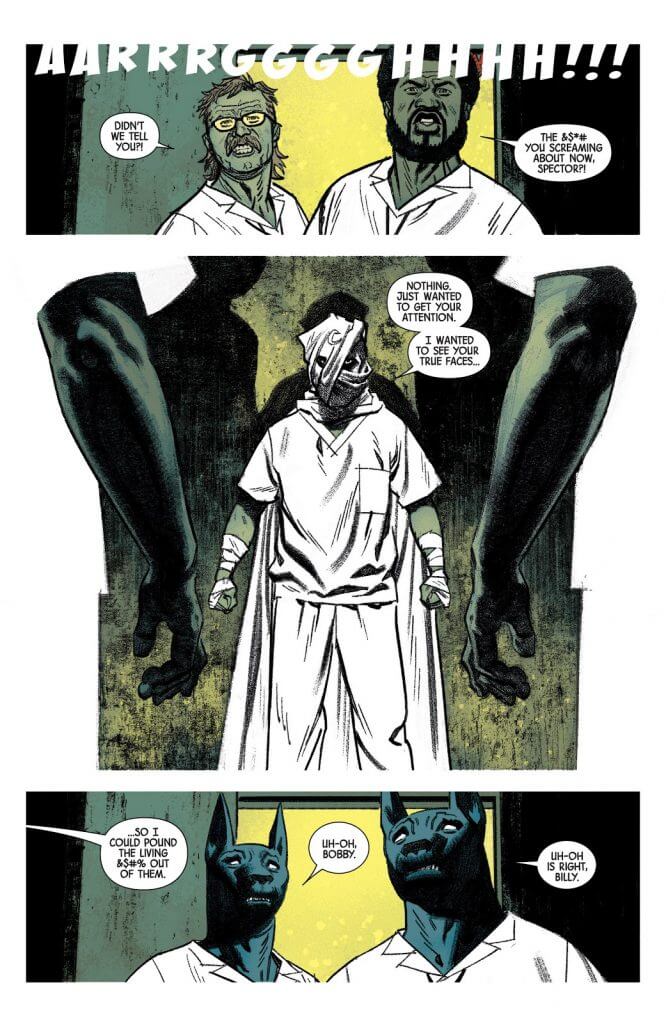
At the same time, we dive headlong into the different facets of the hero, stuck in a trip where each of his personalities tries to take control. Steven Grant creates an illusion where he is a film producer and tries to make a film about Moon Knight (with a hilarious meta panel on the MCU by the way), played by an actor named Marc Spector who causes him difficulties on the set. Jake Lockley, driving his taxi in New York, is embarked in spite of himself in a murder case. Finally, a new personality experiences a completely absurd space war against werewolves in space (no, you are not dreaming), which is probably a reference to the first appearance of Moon Knight in Werewolf By Night #32. If this set seems devoid of logic and incoherent, it actually responds to Marc Spector’s quest to make peace with his different identities, thus returning to his origins in the second part of the run and how Moon Knight was born.
This journey is sublimated by the work of the cartoonists, who create several styles for each personality and give this story a delirious pictorial fiber: the simplicity of the line for Steven Grant, a colorful pop side for Jake Lockley, and a manga aspect to illustrate the madness of the nascent personality that we will call here the astronaut. The drawings of Greg Smallwood, who manages the part centered on Marc Spector (and who had already worked on the character before in Warren Ellis’ no less superb run) are always beautiful and give infinite nobility to the world of Moon Knight.
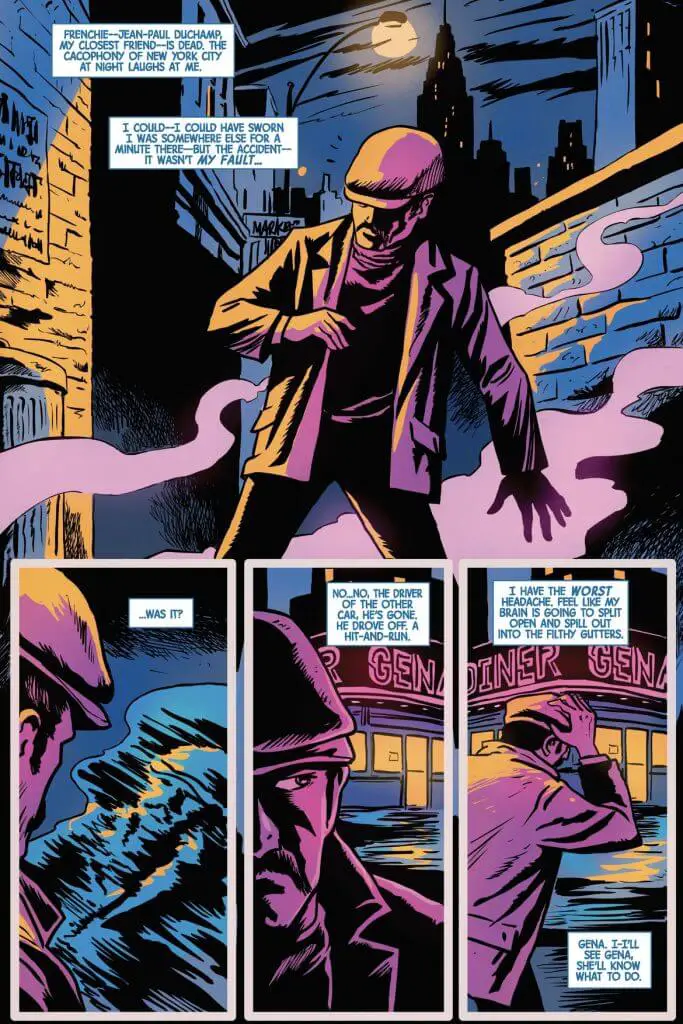
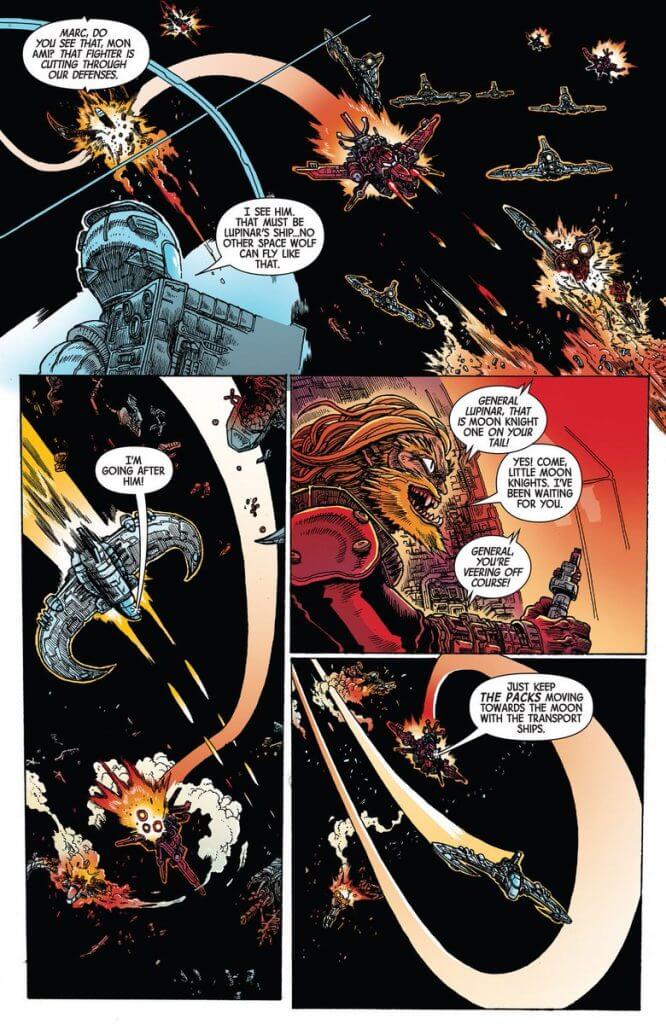
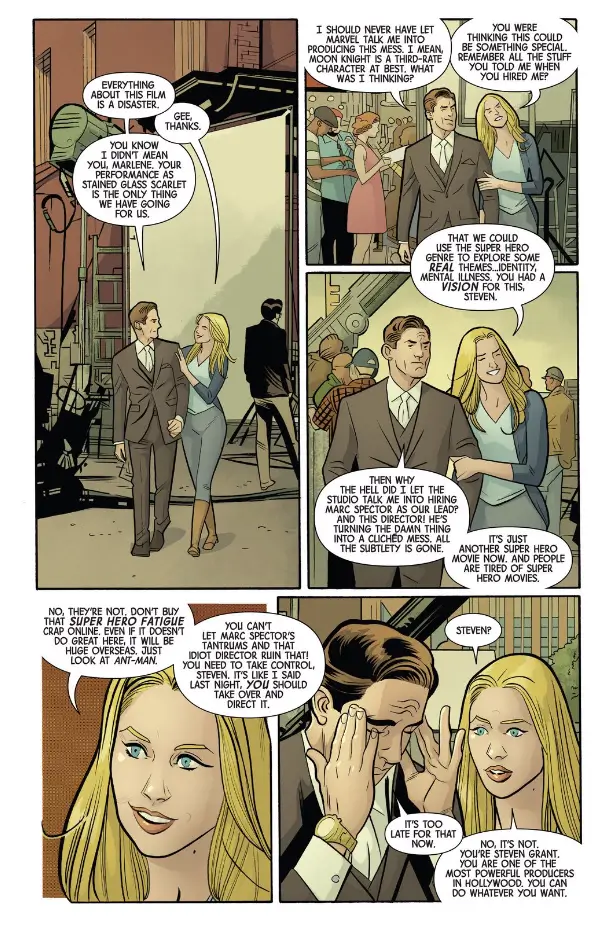
This story finally ends in apotheosis, not by a violent fight as we can be used to (see Charlie Huston’s bloody run), but by a much more intimate confrontation between the hero and his demons: Marc makes peace with his identities and agrees to cohabit with them, realizing that he never needed Khonsu to exist, unlike the latter. When in the last boards, a new Marc Spector puts on his mask to go face crime in the night of New York, we are entitled to wonder if everything we have read so far had happened. Regardless, the main thing is elsewhere, and this is the genius of this arc, a kind of UFO in modern mainstream comics, that the MCU has desperately tried to adapt, without much success.
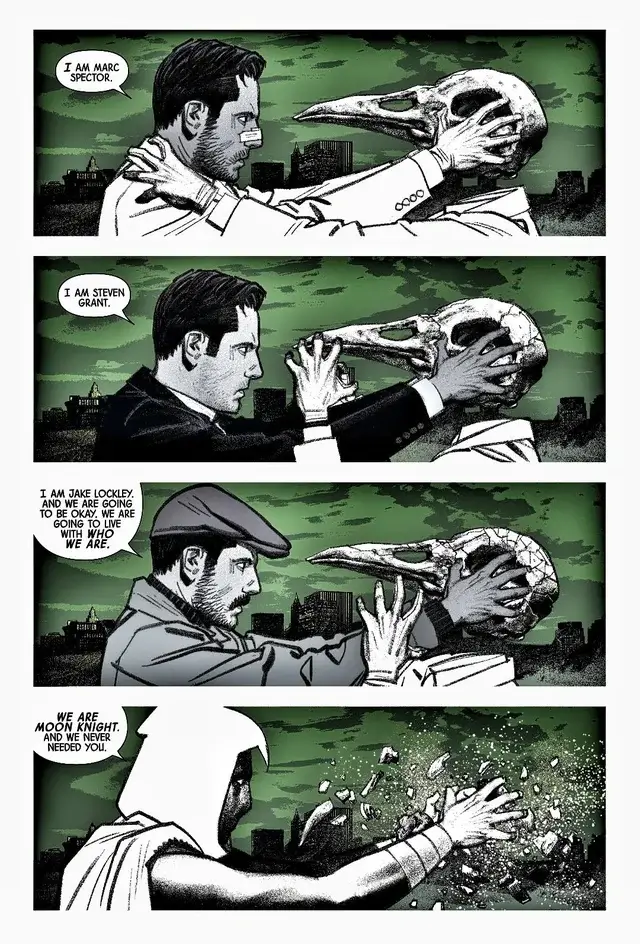
The Moon Knight series is a disappointment that lives up to expectations
When Kevin Feige announced a series about Moon Knight at the end of 2019, a fan of the character that I am was naturally very excited by the possibilities that it suggested. Maybe we were finally going to have a dark and tortured MCU, violent and not afraid to show a mature and superbly written story. Three years later, as difficult as it is to admit, it is a bitter failure. Maybe not as resounding as the other two series announced alongside Moon Knight, Ms. Marvel, and She-Hulk, which we will not talk about again, but failure all the same. We asked ourselves the question of the unadaptable comic Civil War last month, but Netflix has shown that bringing to the screen a dark anti-hero in a very qualitative way was possible with daredevil. Or even a completely crazy character with ultraviolent methods with the least successful but interestingPunisher. The right question to ask would be: is a character like Moon Knight compatible with the MCU and its dogmas? That is something to think about.
In 2019, the empire led by Kevin Feige is at the height of its glory after the release of Avengers: Endgame, the second biggest box office success of all time and which admirably concludes the Infinity Saga. How? Thanks to a relentless formula based on accessible films, humor has become a signature, and endearing characters are embodied by great actors. Faced with the collapse of the competition after the Justice League disaster in 2017, Marvel is now the only superpower when it comes to superheroic blockbusters, and ravages everything in its path. The arrival of Disney+ responds to a desire to further expand the universe and could raise hopes for renewal and bold attempts. Still, Moon Knight looks like many other productions in the franchise, with ubiquitous humor and now questionable special effects (related to the crisis currently shaking the VFX artist industry).
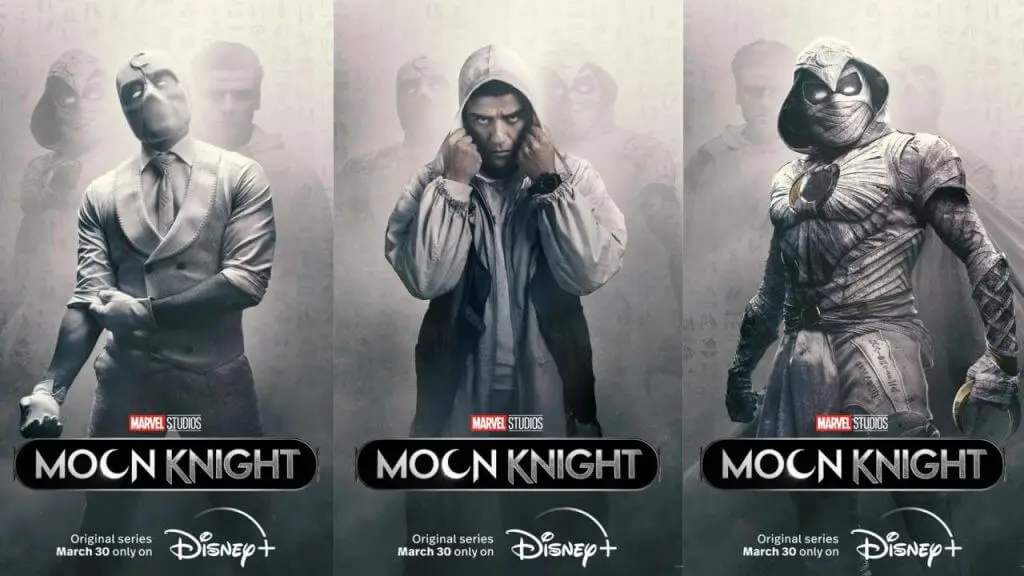
The first episode, however, foreshadowed interesting things. The choice to place Steven Grant as the protagonist, at least at the beginning, was even one of the best ideas of the series by plays the same role as the viewer, a phenomenon accentuated by the use of ellipses. But the rest was a rather big disappointment. Unable to assume the hero it tries to bring to the screen, the series plants itself in the scenery by offering a kind of Indiana Jones adventure, where the fights are soft and poorly choreographed (again not helped by failed special effects), where the scenario advances with difficulty and does not really know where it is going, and especially with a desacralization of one of Marvel’s most fascinating characters. Giving the alter ego of Mr. Knight to Steven Grant could have worked, but hard to keep up when it’s treated as a joke, with the stereotype of the civilian learning to be a superhero stung at Ant-Man. All leads to an ultra-classic finale in which two big CGI monsters compete in the background and the white knight beats the villain thanks to a new ellipse (one too many). Never finding the genius of comics, the series never even manages to find its tone, torn between offering something new that goes off the beaten track or something that will please the general public (theEternalssyndrome in short).
But can we save soldier Moon Knight? Not entirely, but the series sometimes displays snippets of ambition that add to the frustration about it. Its Episode 5, which pushes the MCU to new heights of drama and boldly revisits the character’s origins, is a model of the genre, and perhaps one of the best Marvel content on Disney+ on its own. While the series tries by all means to find the essence of Lemire’s comics, this enchanted parenthesis manages to be a coup de force and a successful adaptation, in the space of 50 minutes. Then, it is impossible not to mention the talent of the actors, especially Oscar Isaac, who brilliantly portrays the anti-hero and his multiple personalities. The supporting roles of May Calamawy and Ethan Hawke are also effective and offer redemptive qualities to Moon Knight. Finally, and even if the hope is slim, the end suggests a possible season 2 capable of going up the slope. Because this hero, so complex and fascinating, certainly deserves better, and because seeing him on screen is still a hell of a pleasure. But also because Marvel proved with its very good Halloween Special on Werewolf by Night that it was able to produce interesting things about its most twisted monsters. So, while waiting for the announcement of this possible season 2, fingers crossed (and read Moon Knight).

Further reading
Jeff Lemire’s run on Moon Knight is available in an album of more than 300 pages available right here, but I strongly invite you to immerse yourself in other stories of the white knight, with for example the visceral passage of Charlie Huston. The title was covered by Jed MacKay in 2021 and is also a great success for the moment (the first 5 numbers are contained in this album). If you haven’t seen it before, make up your own mind about the series, which consists of six episodes on Disney+.
Moon Knight’s future in the MCU is still unclear, especially after a rather lukewarm reaction from the public. However, Oscar Isaac has several times stated in interviews that discussions were ongoing to determine the way forward and has already teased a season 2 of the series. With the arrival of Werewolf by Night and the future of Blade (despite a movie postponed by several months), we can also assume that a Midnight Sons crossover is on Kevin Feige’s table, but, with an already busy schedule and two Avengers movies on the way to 2025 and 2026, it’s hard to be certain of anything.
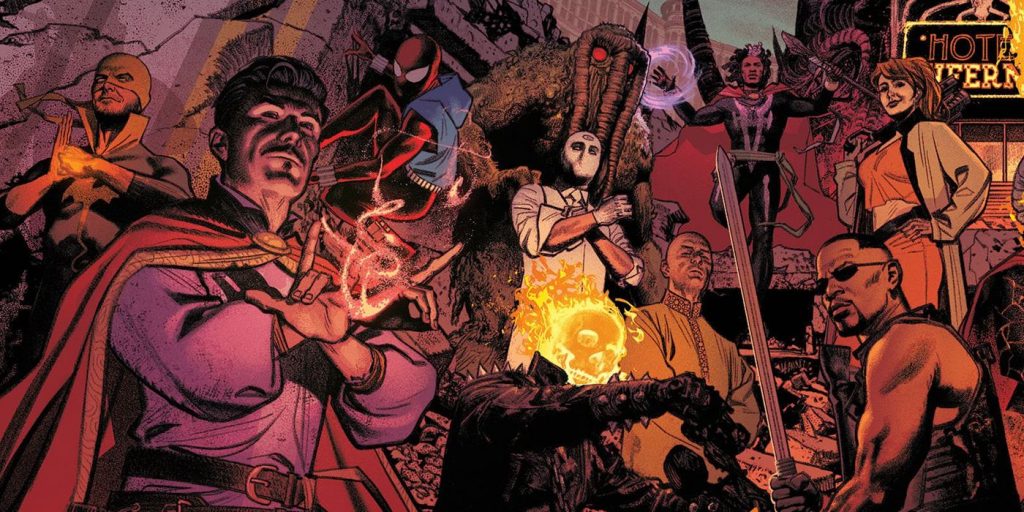


Leave a Reply